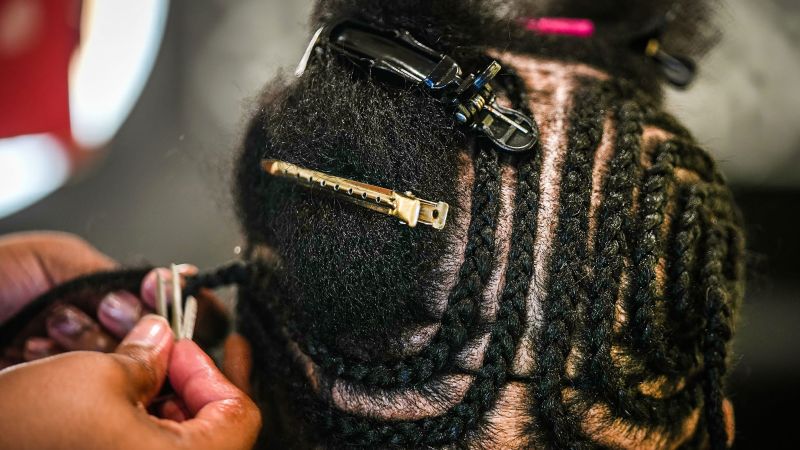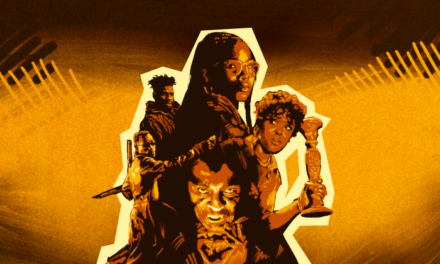
CNN
—
The family of a Black high school student who has been suspended for weeks over his locs hairstyle have sued Texas state leaders, requesting the governor take action to protect the 17-year-old from hair discrimination.
Black natural hair advocates say the legal battle has renewed focus on the history of hair discrimination in the US and the need to pass a national CROWN Act.
What is the CROWN Act?
The CROWN Act and similar laws protect against race-based hair discrimination by making it illegal to deny employment and educational opportunities based on natural hair texture and protective hairstyles.
The legislation, which stands for “Creating a Respectful and Open World for Natural Hair” (CROWN) has been championed by natural hair advocates who argue Black Americans have faced discrimination in the workplace and in schools because of their hair.
What hairstyles are protected by the law?
Although the language of each law differs across the states that draft them, CROWN Act laws generally prohibit discrimination based on hairstyles that are commonly associated with a particular race or culture, including Black hairstyles like locs, braids or Bantu knots.
These styles are known as “protective hairstyles” because they help maintain the health of the hair by tucking strands to prevent additional stress and breakage, which promotes hair to grow. The styles also protect the hair from the overuse of heat from styling tools such as flat irons.
A history of hair discrimination
Discrimination against protective hairstyles dates back to slavery, according to Adjoa B. Asamoah, the lead legislative strategist and co-creator of the CROWN Coalition, an organization that advocates for national legislation banning hair discrimination.
Asamoah said culturally, for many Black people, hair care has become an “intricate part of just our way of being,” linked with family, community and pride.
“You see things like bonding time between mother and child when it’s wash day or get your hair braided if you have an older sibling,” she said. “Those relationships around our hair care also strengthen familial ties.”
But for centuries Black people – especially women – have faced discrimination because of their hair.
“(Historically) we saw our crowns being disrespected, our hair being referred to as unsightly or wool,” Asamoah said. She also noted in 1786, Louisiana enacted the Tignon laws, which required Black women to cover their heads in cloth. Many rebelled by wearing elaborate head dresses.
Today, hair discrimination is more commonly seen in professional and educational dress codes, Asamoah said. Those policies frequently favor attires and styles influenced by European standards of beauty, advocates have said.
“We know that hair discrimination includes being fired … being passed over for promotions and even having offers of employment rescinded,” she said. “And it’s been the reason that far too many children, too many Black children in particular, have missed school or had negative educational experiences.”
National CROWN Act efforts have stalled
In March 2022, the then-Democratic controlled House advanced a national CROWN Act legislation but it later stalled in the Senate.
Members of the Congressional Black Caucus in December 2022 wrote a letter to Senate leadership urging them to take action to pass the bill. The measure would have banned race-based hair discrimination in employment, public accommodations and federally assisted programs and housing programs.
Congress has yet to take up the legislation again.
The Biden administration has said it “strongly supports” the CROWN Act and “looks forward to working with the Congress to enact this legislation and ensure that it is effectively implemented.”
The push for federal legislation has also been championed by Dove, National Urban League, Color of Change, the Western Center on Law & Poverty and other advocacy groups.
State efforts gain momentum
But where national efforts to pass the legislation have stalled, the movement has gained momentum at the state-level.
In 2018, video of a school official using scissors to cut a Black student athlete’s locs sparked a backlash online. The high school wrestler was ordered to cut off his locs or forfeit a match, CNN previously reported.
In response, advocates began calling for legislation to protect students – and others – from hair discrimination.
In February 2019, New York City issued “legal enforcement guidance” to the city’s Human Rights Law. The provision ensures New Yorkers right to “maintain natural hair or hairstyles that are closely associated with their racial, ethnic, or cultural identities.”
In July, the state followed suit when then-New York Gov. Andrew Cuomo amended the Human Rights Law and Dignity for All Students Act, to clarify both laws also protect against discrimination based on hairstyles or textures associated with race.
California Gov. Gavin Newsom also signed a law in July 2019 that banned hair discrimination. It went into effect the following year.
As of July 2023, more than 20 states have enacted legislation to combat race-based discrimination against hair texture and protective hairstyles, according to the Economic Policy Institute.
The latest battleground
In Texas, a version of the law went into effect on September 1 and was quickly put to the test when a high school student was suspended because his locs hairstyle violated the schools dress code.
Darryl George, a junior at Barbers Hill High School, has been suspended for more than three weeks because his locs hairstyle violates the Barbers Hill Independent School District dress and grooming code, according to his family.
While the school district does not prohibit students from wearing locs or braids, CNN previously reported the dress code does place limitations on how long a male student’s hair can be, stating hair “will not extend, at any time, below the eyebrows or below the ear lobes.”
George and his mother filed a federal civil rights lawsuit arguing Darryl’s suspension is a violation of the state’s CROWN Act, which prohibits discrimination against hair texture and protective hairstyles like locs and braids that are “commonly or historically associated with race.” The lawsuit also alleges Texas Gov. Greg Abbott and the state’s Attorney General Ken Paxton have failed to enforce the law.
Attorneys for Barbers Hill Independent School District have also asked a court to clarify “whether the newly passed CROWN Act prohibits grooming policies addressing the length of a male student’s hair,” according to district spokesperson David Bloom.
For Asamoah, the saga only underscores the need for a national law. She said a child’s education should not be impacted because of their hair.
“That should never be the case,” she said. “We should never see a child missing school based on hair.”
CNN’s Veronica Stracqualursi, Faith Karimi and David Williams contributed this report.
CNN’s Veronica Stracqualursi, Faith Karimi and David Williams contributed this report.





